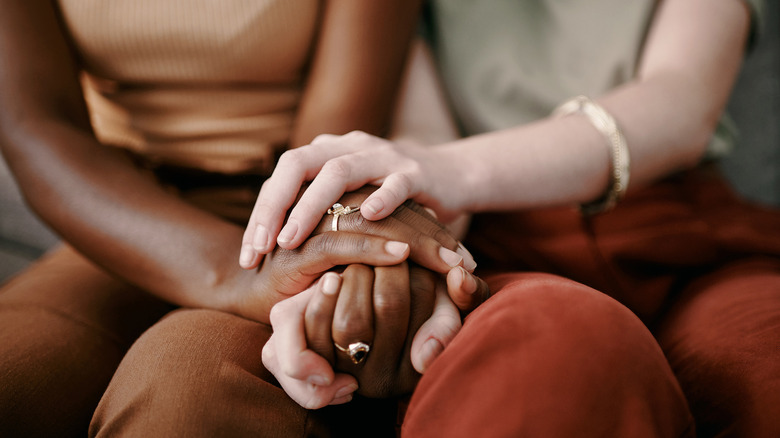Your Guide To Managing Social Burnout Without Going Full Hermit
Have you been feeling exhausted by in-person interactions? Ready to camp under the covers for a few months? After a few years of social restrictions from Covid, and the complexity of social gatherings as we transitioned from lockdown to masks and outdoor-only events, some of us have had difficulty recovering our social skills.
This is called social burnout, described by Psychology Today as: "Much like regular burnout, it consists of feeling stressed, anxious, overwhelmed, irritable, and disconnected. [It] describes the feeling that no matter how much we do socially, we can't keep up and end up feeling drained." The publication mentions that many of us are "over-scheduling ourselves" now that people are getting to all the events they couldn't during the pandemic. It can be too much to handle, and it's exhausting — Social situations can be draining even if we want to see our friends. In addition, those of us who are natural introverts may have been dealing with this already.
We're going to take a look at the things that can cause social burnout and give you some techniques to combat it. Don't worry, we're not going to tell you just to grin and bear it. You are not alone in this.
How to recognize social burnout
Social burnout isn't just for introverts, who, according to Psych Central, "invest a lot of energy trying to navigate socially demanding environments, leading to social exhaustion." Extroverts also suffer from social burnout, particularly after the pandemic, and may be frustrated because they were so good at social interactions before.
How can you tell that what you're dealing with is social burnout? You're tired and drained around people, no matter how much rest you got the night before, anxious, depressed, and even short-tempered. You may also be avoiding parties or family gatherings. Psychology Today also lists the symptom of "answering questions in the same way, almost following a script." You can be distracted and jumpy, unable to focus on tasks, or you might not want to look at messages that come in over email or text. Working from home and not seeing co-workers every day can be a contributing factor for some people as well.
You might even feel guilt over avoiding friends or relatives, and make plans only to cancel them later. It can sometimes feel like your brain is telling you, "I cannot manage small talk today, so avoid other humans, please." It makes things difficult because sometimes unplugging can mean hiding away from the entire world.
Tips to help you manage social burnout
If you're experiencing social burnout, there are a few ways to combat it. The first one is to share your feelings with your friends if you're comfortable doing so. One way to do so is to say something like, "My social battery is low right now, and I need some alone time," or "I'm feeling socially overwhelmed. Do you mind if I skip the party so we can see each other one on one later?"
Lifehacker suggested we identify our triggers for burnout. Do parties make you feel anxious? Speaking in front of a group? Family gatherings? Work-related get-togethers? It could even be too much time on Zoom or similar apps. No matter the reason, knowing what might set you off can help you prepare. The site also recommends setting boundaries. Noah Clyman, licensed clinical social worker, certified cognitive behavioral therapist, and director of NYC Cognitive Therapy told Lifehacker that we should "practice assertiveness" when we're telling people what we need for our own well-being. Clyman also suggested "silencing certain types of alerts or specific conversations." If social media is your trigger, try turning off notifications and moving the apps to a harder-to-access place on your phone. If it's meetings at work, perhaps they can be rescheduled, or you can attend them remotely.
Also, remember that you are allowed to have boundaries for your life. It is okay to say no to things that don't make you happy or when you need a break.
Preventing social burnout in the future
There are several ways to protect your alone time. Again, letting your friends know that you need a break can help. You can set a five-minute break timer each hour to let your brain rest, and Clyman mentioned meditation as a good option to help calm you when social burnout hits. Psychology Today recommends being flexible with ourselves because "We're all a bit socially rusty these days." They also tell us that putting our events on a calendar where you can see the whole month is a good idea. That way, you know which days may be too much.
Another idea is to schedule some alone time and make it as much of a priority as your meetings and events; Make it a date with yourself. If you're setting up time with friends and family, a few activities might allow you to take small breaks from constant eye contact, like anything in a car, hiking together, or even a movie where you're not talking to each other for two hours. It also gives you a conversation topic for after. If you find that it's not enough, seeking professional help can help you combat social burnout.
If you or someone you know needs help with mental health, please contact the Crisis Text Line by texting HOME to 741741, call the National Alliance on Mental Illness helpline at 1-800-950-NAMI (6264), or visit the National Institute of Mental Health website.



